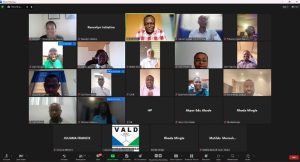In its determination to encourage the use of data to drive home the campaign against tobacco use and addiction, the Renevlyn Development Initiative (RDI) has organised a tobacco and data journalism training for journalists in Lagos, Abuja, Enugu and Kwara states.

Other groups that interacted with the journalists are Development Gateway, Vision for Alternative Development (VALD) Ghana, and representatives of International Food Policy Research Institute (IFPRI).
At the opening of the training on Monday, January 29, 2024, RDI Project officer, Ifeoluwa Adediran, said that the training falls under two of the organisation’s thematic areas: Public Health, as well as Media, Research and Publications through which journalists are capacitated to report from well-informed perspectives.
Executive Director of RDI, Philip Jakpor, pointed out that there was need for journalists to break away from the monotony of reports that relied only on outdated data from few sources.
Jakpor explained that for too long reports on tobacco control in the indigenous media have been limited to statistics about tobacco-induced deaths from the World Health Organisation (WHO) and scanty national data alone.
He explained that there is need for more robust and educative reports on tobacco control and that the urgency of transiting to more data-driven reports is because the tobacco industry is now investing more in promotional and marketing tactics using social media and influencers who ignorantly regurgitate industry lies and lines.
He revealed that the Centre for Disease Control and Prevention recently exposed that in the US alone the amount that the tobacco industry spent on visibility activities including cigarette advertising and promotion increased from $7.84 billion in 2020 to $8.06 billion in 2021.
“In Nigeria we are also witnesses to all kinds of promotional activities that run into millions of naira by tobacco companies in the media space in their determination to grab more lungs. They also exploit the social media to circumvent regulations around tobacco marketing and industry interference with health policy.”
He encouraged the journalists to identify interlinking issues from which they can also obtain data that policy makers can rely on to make laws that are rooted in facts.
A media strategist, Vanessa Adie Offiong, encouraged journalists to deploy more data and visualisation in their work to make tobacco stories relevant and engaging to the audience.
Offiong listed areas where there are scanty tobacco data to include the number of tobacco workers contacting diseases while working on tobacco fields; effect of direct or second-hand smoke on pregnant women and newborns; water and soil contamination from tobacco; illicit tobacco trade; and smoking in public places and contraventions of the National Tobacco Control Act 2015, among others.
In his intervention, a research analyst with the International Food Policy Research Institute (IFPRI), Austine Iraoya pointed out that data-driven stories can come from reporting tobacco taxation. He elucidated on the fact that more research is needed to evaluate the impact of tobacco taxation on tobacco use in Nigeria to track consumers’ behaviour, insisting that this will also help to explore the influence of tobacco companies on tax policies.
In a similar vein, Executive Director of Vision for Alternative Development (VALD), Ghana, Labram Musah, said that tobacco use, and addiction can also be linked with attainment or otherwise of the Sustainable Development Goals (SDGs) hence the need for journalists to reference them in their reports.
For instance, Goal 3 of the SDG which promotes healthy lives and well-being for all at all ages, includes a section on strengthen the implementation of the World Health Organisation – Framework Convention on Tobacco Control (WHO-FCTC) in all countries, as appropriate.
He decried that there are few tobacco reports that reference the SDGs, encouraging the participants to bridge this gap.
The highpoint of the training was the intervention of Seember Ali of Development Gateway who made a presentation on the Tobacco Control Data Initiative (TCDI).
Ali noted that the TCDI, which was conceived and set up by Development Gateway in partnership with the University of Cape Town’s Research Unit on the Economics of Excisable Products and funded by Bill and Melinda Gates Foundation, serves as a go-to dashboard for credible data.
She explained that the dashboard which can be found on https://nigeria.tobaccocontroldata.org/en was set up in 2019, and “aims to supply governments, civil society, and academia with improved access to country-specific data that will inform better tobacco control policy design and implementation.”
“The TCDI is a one-stop dashboard that warehouses real-time tobacco control data in the country to synthesise findings and plug key data gaps in tobacco control, as well as visualise specific tobacco content in a more engaging way.”
The TCDI is also being implemented in Democratic Republic of the Congo, Ethiopia, Kenya, South Africa, and Zambia as a strategy of integrating both primary and secondary research to present comprehensive and credible data on tobacco use in Africa.
